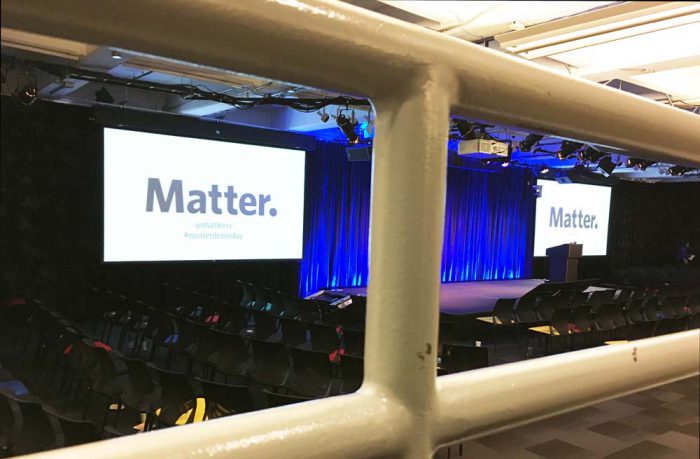
When Matter managing director Corey Ford helped launch the accelerator in 2012, things were already looking bleak for media companies, which were struggling both culturally and economically in the the era of the web. And then Donald Trump became president, and, in his repeated attacks on media institutions, made things feel even worse.
In the wake of Trump’s election, “I was terrified,” Ford said at Matter’s New York City Demo Day on Tuesday. “And that had nothing to do with Republicans and Democrats. It felt like there was an assault on basic human decency as well as a threat to some of the core democratic values that make us who were are.”
Matter, which runs participants through a grueling 20-week crash course in media-focused entrepreneurship, has codified some values of its own. Ford said during Tuesday’s event that the firm’s mission is to support “a more informed, empathetic and informed society” by funding ventures that tackle, in various ways, some of society’s big problems. One of the latest round of projects, CivNet, for example, wants to build a platform from real-word activism, while Grafiti is trying to fight fake info by building tools to make charts and data easier to produce and share.These ventures, and the 10 others that joined them, are a product of a “culture of experimentation” that Matter has built over the past five years. I spoke to Ford about the importance of that kind of culture in media today, how Matter has blended the values of public media with the mindset of entrepreneurship, and why all of this is sorely needed after last year’s election.
But I never could have predicted that things in the world would take such a dire turn in terms of the cultural attacks on media, and the attacks by the president of the United States on the media. Media is stepping up in this moment, and I think we’re all realizing how important both media institutions and entrepreneurs within the media are. And I think we at Matter have found ourselves in a place where we’re filling a really important need at a time where it’s needed most.
If you asked me a year ago if I would be investing in Rewire, a start up that is making secure email, I would have said, “No, that’s not in our scope.” But it’s so clear today with the attacks on journalists that are happening that that kind of thing is really important. So what I think we discovered is that over these last five years we’ve built a really strong brand, and, even more importantly, a really strong community, and we really stand for something in this critical movement.
I don’t think anyone else could have invested in a company like Rewire. They wouldn’t have taken their money; they wouldn’t have trusted them. And we’ve created an opportunity for folks to come and build things that aren’t being built in other places.
You also have projects that are a bit more “out there” like DADA, which is about building creative communities and actually helping them monetize that with blockchain underneath. Why did we take a company like that, that isn’t super focused on journalism? Well, they’re experimenting with blockchain and ownership and new models of monetization of particular types of content. So what we learn there could end up applying to journalism as well. It’s a very wide range.